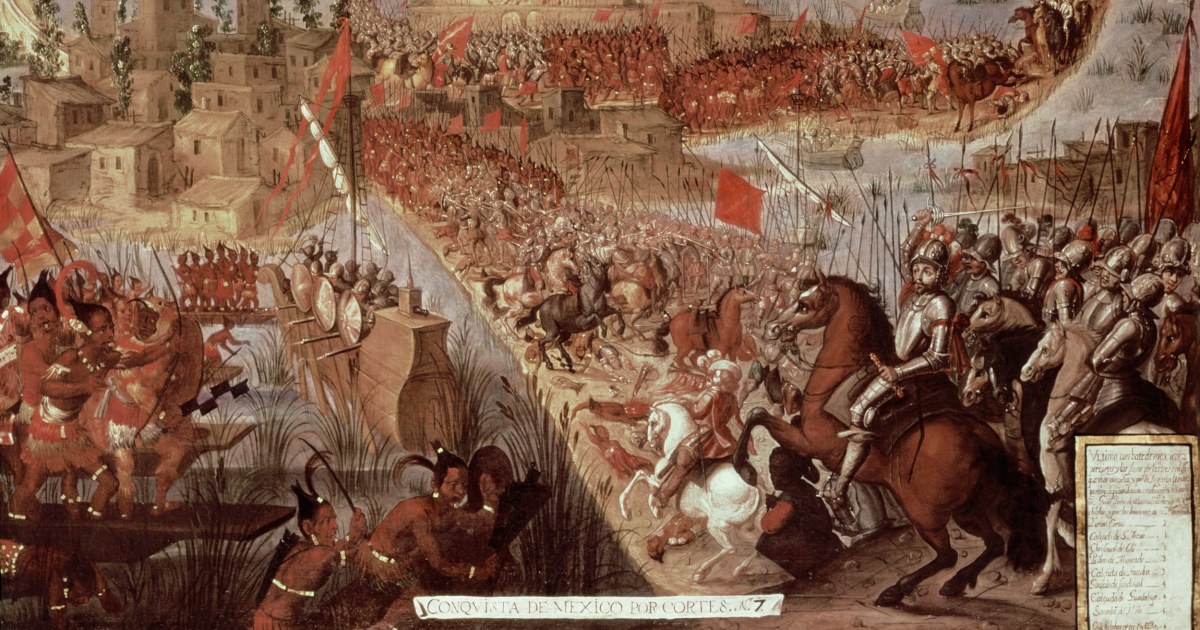
As Mexico looks back on the 500th anniversary of the Spanish conquest of the Aztecs, an award-winning filmmaker wants his fellow Mexicans and others to confront their national identity — and re-examine how the legacy of colonial history still impacts people today.
“Nationalism tells you where you come from so it can tell you where you’re going,” Rodrigo Reyes told NBC News. “I think it’s important to feel proud of where you’re coming from. I’m super proud of being from Mexico. But I do believe that some of these narratives are so simplistic, so black and white, that they damage our understanding of who we are and how we’re interconnected.”
On Aug. 13, 1521, the army under Spanish “conquistador” Hernán Cortés took the Aztec capital of Tenochtitlán after a brutal siege with warships and cannons that lasted at least 75 days. The popular idea of a small Spanish army defeating a much larger Mesoamerican empire is factually incorrect, Reyes said.
“We have this mainstream Mexican identity as the heirs of the Aztecs, which is completely false,” Reyes said. “There were also thousands of Indigenous allies who were instrumental in helping Cortés win. They collaborated and worked together and participated in the exploitation of other [Indigenous] groups.”
The filmmaker described his movie “499,” which won best cinematography as a documentary at the 2020 Tribeca Film Festival, as an “anti-epic” that “hacks the 500-year anniversary of the Spanish conquest” to expose the far-reaching footprint of colonialism that still lingers over Mexico today.
“We spoke with an amazing group of scholars who are local chroniclers, and they point out that the conquest didn’t end on Aug. 13, 1521,” Reyes said. “It continues to this day because Mexico sadly has a huge problem with racism and classism that forces Indigenous communities to assimilate.”
The movie, premiering in New York on Aug. 20, is a hybrid of a documentary and a fiction film. It follows a 16th-century chrome-armored conquistador (played by Eduardo San Juan) who travels through time to modern-day Mexico and goes on the path Cortés’ army took from the coast of Veracruz to Mexico City.
The conquistador narrates moments from the Spanish invasion in 1521 as he is also compelled to listen to the testimonies of contemporary Mexicans — who are grappling with their own issues around violence and politics a half-millennium after Cortés’ army’s victory.
The movie, Reyes said, reveals a mirror in the shape of the conquistador so viewers can see how contemporary Mexicans could carry a small part of him inside them. History, Reyes said, is not something remote or alien but very much alive in different parts of society.
“Sometimes we don’t want to recognize ourselves in these characters for who they are,” Reyes said about the conquistador and other antiheroes in national stories. “We want to simplify history so that it can comfort us and bring us together. But this can also blind us by being overly simplistic.”
Mexico, U.S. struggle with ‘uneasy truths about the past’
Mexico has sometimes gravitated toward this simplistic view of history, which distorts both its past and its present, he said.
Mexican President Andrés Manuel López Obrador wrote a letter to Felipe VI, king of Spain, denouncing the inhumane violence of the Spanish Empire on the 500th anniversary of the arrival of Cortés’ army in 2019. Obrador’s government has also renamed the five-century anniversary of the conquest as 500 years of Indigenous resistance. But hundreds have denounced this rebranding as a token gesture and marched to the National Palace on the International Day of the World’s Indigenous Peoples (Aug. 9) to demand greater inclusivity for 23 million Indigenous peoples in Mexico.
When comparing the Mexican government’s perspective of history with the United States’, the filmmaker said both countries struggle with uneasy truths from the past.
“In the U.S., we’re still wrestling with the fact that George Washington was a slave-owner and the founding father of our country,” he said. “The stories of victims are pretty often being erased. And this is true for every country that is grappling with a history that remains unattended.”
Reyes said this is the case for many Latinos and other diverse groups in the United States who are struggling with the unattended history of their own communities and demanding greater inclusivity in mainstream society.
In the U.S., pressure to remove monuments that commemorate the country’s colonial and Confederate pasts, like the 36-foot equestrian statue of Juan de Oñate in El Paso, Texas, have divided communities over exalting or decrying European conquistadors and settlers. But engaging with history, the filmmaker said, can help people work through centuries of cultural and social traumas.
The ‘atrocious’ reality of conquest
“For the defeated, the days immediately after the fall of Tenochtitlán were atrocious,” historian Hugh Thomas wrote in his book “Conquest: Montezuma, Cortés and the Fall of Old Mexico.”
Thomas wrote that when looking back at the destruction of the Aztec Empire and the conquest of other Indigenous peoples in the Americas, European colonizers have tried to justify the violence by denouncing Indigenous communities’ brutal acts of human sacrifice and murder.
In the case of the Aztecs, the Spanish condemned how priests tore out the hearts of prisoners and slaves and wore the skins of their victims inside out. Both British and American colonists similarly seized upon the action of scalping by some Native Americans to defend violent reprisals.
Yet historians say the magnitude of violence the Spanish conquest had on Mexico — as well as the destruction perpetrated by other European conquests in the Americas — is undeniable.
Thomas referenced a letter from Pedro de Maluenda, a commissary working with Cortés, which said making the trip back from Tenochtitlán to Veracruz was like traveling from hell to heaven.
The historian described a devastated city in the wake of the Spanish conquest, with defeated Aztecs leaving their homes in smoke and ruins and the streets of their capital full of unburied bodies.
To put the size of the destruction into perspective, Thomas described Sevilla, Spain’s biggest city at the time, as “probably a mere quarter of the size of Tenochtitlán.” The Aztec capital was bigger than any other city the Spanish soldiers had seen.
“If the lake dwellers [the Aztecs] were fascinated [by the Spanish], Cortés and his men also felt awe,” the historian wrote. “For in front of them lay a city as large as any that anyone in his party had seen — though Naples and Constantinople, with over 200,000 people each, ran Tenochtitlán close.”
For Reyes, the footprint of colonialism still looms over the Americas, in large part because different groups don’t heed the lessons of history through the eyes of others’ experiences.
“We are in a moment of conflict. And there are huge sectors of society, huge sectors of power, who do not want to listen to the voices of people who are being impacted by the lingering actions of colonial domination,” he said. “If we can listen to the voices of our history, then we can actually reinvent the future.”
Reyes is currently taking his film on a pilgrimage of sorts through Mexico, screening “499” for people living on the historic warpath that Cortés took from Veracruz to Tenochtitlán. On Aug. 13 he will arrive in Mexico City — which is built on the ruins of the Aztec capital.
“We’re constantly trying to make sense of history, trying to use it to understand our moment right now,” Reyes said. “And ‘499’ promotes the idea that we need to be more active writers about our own histories.”
Follow NBC Latino on Facebook, Twitter and Instagram.
Source: | This article originally belongs to Nbcnews.com









